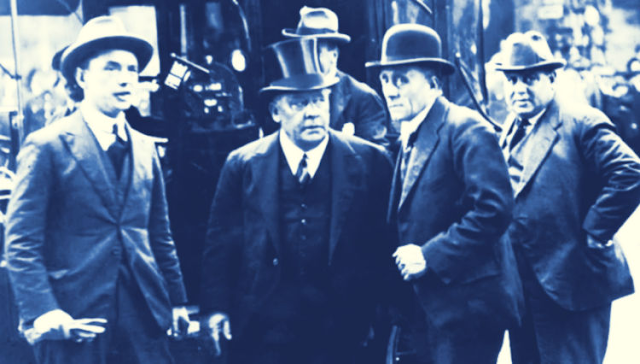 |
| War Booster Extraordinaire |
Horatio Bottomley (1860–1933) was a man of humble origins, who became a famous, popular, and larger-than-life character during the years before and during the First World War. He started up the populist magazine John Bull and other newspapers and magazines and made a great deal of money out of these and other business ventures. He was twice elected to Parliament. Bottomley was involved in several failed companies and narrowly escaped being convicted of fraud at trials in both 1893 and 1908.
During the war, after his offer to serve as Director of Recruiting was rejected by the Government, he set himself up as an unofficial war recruiter and propagandist, holding vast meetings which whipped up the crowd to a fever of anti-German feeling and patriotism. His style was bombastic and jingoistic, but wildly popular, and his hundreds of "patriotic war lectures", publicized and performed like music hall entertainment, made a great deal of money. The profits were advertised as going to his War Charity Fund; in fact, they went into Bottomley’s own pocket.
The swindle that finally brought him down involved the Victory Bonds Club, which was set up in 1919. Bottomley claimed that for a minimum investment of £1 (compared with £5 for the underlying bonds), subscribers would get the chance to win prizes from a lottery funded by the interest payments. Bottomley used the money in a bid to rebuild his media empire, as well as to fund an extravagant lifestyle.
 |
| Arriving at Bow Street Court for His Trial |
Bad investments, poor administration, and the high level of expenses meant that the club could only survive if it could find new investors (turning it into a de-facto Ponzi scheme). Unfortunately for Bottomley, investors started to lose confidence in the scheme, pulling their money out. In 1921 Reuben Bigland, Bottomley's former business partner, published a pamphlet attacking him and the club.
After Bottomley lost a libel case against Bigland, he was arrested by the police. He went to trial on 19 May 1922. After a 28-minute deliberation by the jury he was convicted of embezzling £170,000 and sentenced to serve five years in prison. After serving the full sentence, he tried many schemes to resurrect his fortune—even a music hall speaking gig—but died destitute on 26 May 1933.
Sources: Scotland's War; Money Week; The Times Literary Supplement

Horatio Bottomley life proves to reflect the means a person would use including during times of war concerning his unscrupulous ambition to achieve wealth through manipulative tactics. The learning lesson is understand a persons integrity, and accountability before trusting them.
ReplyDelete